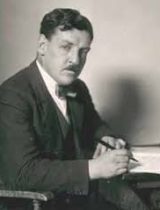

English composer Gordon Jacob was one of versatile style and skill who believed “the day that melody is discarded altogether, you may as well pack up music altogether” which led to his compositional style being accessible, inspired by Baroque and Classical models, while having moments of dissonance but striving to communicate clearly with the listener. Jacob composed over 700 works for symphony, choir, ballet, chamber ensemble, and band along with patriotic works, film scores, and arrangements. In addition to his musical compositions, he wrote musical textbooks including Orchestral Technique (1931), How to Read a Score (1944), The Composer and his Art (1955), and Elements of Orchestration (1962) which are still in wide use today.
Gordon Jacob was the youngest of ten children. He had a cleft palate and suffered a hand injury while young, so Jacob’s abilities as a performer were quite limited. Jacob began studies at Dulwich College but enlisted into active service during World War I at age 19. In 1917, Jacob was taken as a prisoner of war as one of only 60 men (of his battalion’s 800) to survive. During this time, he and some of his fellow POW’s formed a make-shift “orchestra” in the prison camp. After the war, Jacob studied journalism for a year before a grant allowed him to study composition, theory, and conducting at the Royal College of Music under Vaughan Williams, Stanford, and others. After completing his education at the RCM, Jacob taught briefly in London before returning to the RCM as a teacher where he remained until his retirement in 1966.
Jacob’s career as a composer spanned 60 years with his music showing the influence of early 20th century French and Russian styles. His first success as a composer was with his William Byrd Suite written during his student years. His one ballet, Uncle Remus, was written for The Royal Ballet (then Sadler’s Wells Ballet Company). Jacob was also not afraid to compose lighter music for a radio comedy show as well as music for several propaganda films. He delighted in writing music which filled gaps in current repertoire; he composed for instruments commonly overlooked(such as the trombone or double bass), a piano concerto for three hands to accommodate the handicapped Cyril Smith, and even pieces for the harmonica. Jacob did not possess the ego of his elitist peers and composed for the increasingly popular wind band as well as pieces for ensembles of younger children.
Gordon Jacob died in 1984, survived by a widow and two children.